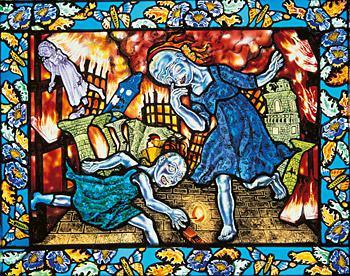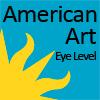
Judith Schaechter, A Little Torcher, 1990, glass, Smithsonian American Art Museum, Gift of the James Renwick Alliance and museum purchase through the Smithsonian Institution Collections Acquisition Program
This is not your grandmother's stained glass. Inspired by sources as disparate as comic books, old cartoons such as Popeye, Japanese woodblock prints, medieval tapestries, and punk rock, Judith Schaechter practices a contemporary alchemy: turning glass into dark narratives. Other influences she mentioned in an informal conversation include, "Balthus, Brancusi, Bosch," and with tongue firmly in cheek, "any artist whose name begins with the letter B." Featured in the Renwick's current History in the Making: Renwick Craft Invitational 2011, Schaecter's vision shines a whole new light on traditional stained glass.
The Philadelphia-based artist is a meticulous craftsman, who studied oil painting at the Rhode Island School of Design, and makes her own tools. One visit as an undergrad to the hot shop where they were making stained glass, turned her focus from canvas to glass: "I saw the stained glass and I wanted to do it and nothing else."
In the Renwick exhibition, the narratives she creates, such as The Sin Eater and A Little Torcher feature characters who often appear pained. Answering the question, "Why are you drawn to tortured images?" the artist says, "They don't seem tortured to me. I think the faces I make are of people in transition. They don't seem despairing or lost in the dark. They are all people having an epiphany, which keeps with [the theme of] traditional glass in cathedrals."
The contrast of the gritty and the sublime, the thorn and the flower marks these works as well as many other of Schaechter's pieces. "It's about despair but I don't want the work to dwell on it. My pieces are reflective...optimistic. [A person is] walking out of their personal maze but will they get there or not? It's a troubled person trying to get untroubled."
On Sunday, May 22, at 2pm, Judith Schaechter will be speaking in the Renwick's Grand Salon on her themes, process, and life as a glass artist.

